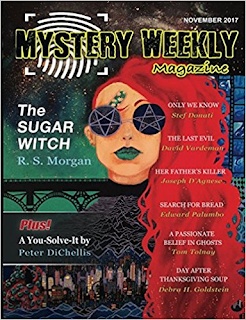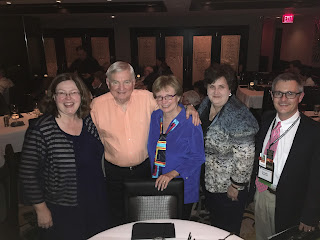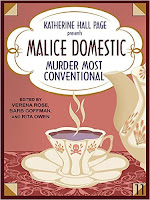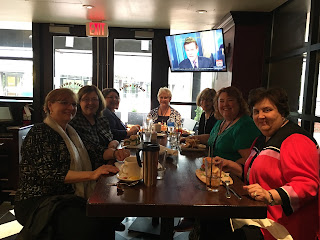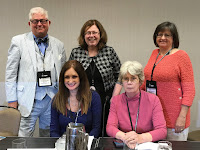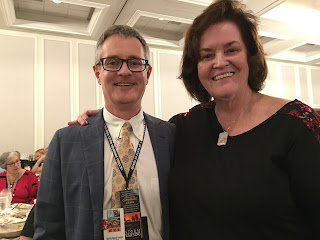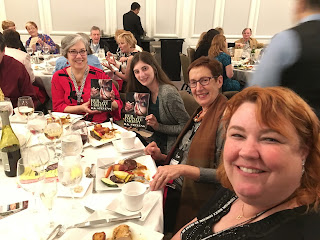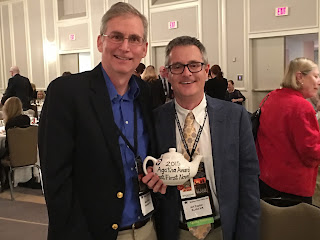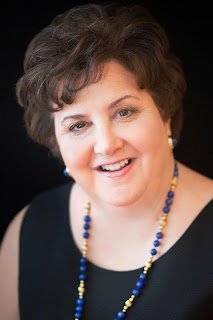Looking Forward to Mystery Short Story Award Season
Gail Benson
is quickly approaching for recognizing short story excellence in the mystery
field. The following authors have been nominated for Agathas for their short
stories, an award presented at the Malice Domestic conference at the end of
April:
Short Story
Press)
“Whose Wine is it Anyway”
by Barb Goffman in 50 Shades of Cabernet (Koehler Books)
“The Night They Burned Miss Dixie’s
Place” by Debra Goldstein in Alfred Hitchcock’s
Mystery Magazine (May/June 2017)
“The Library Ghost of Tanglewood Inn”
by Gigi Pandian (Henery Press)
“A Necessary Ingredient”
by Art Taylor in Coast to Coast: Private Eyes from Sea to Shining Seat
(Down & Out Books)
Please
notice that each of the nominated stories has a link that will allow you to
read it. Let me assure you that you’ll enjoy each one. Next month, we’ll have
an interview with the authors.
In
2013, I surveyed the awards given to mystery short stories in a post for
Writers Who Kill. Here’s a link to that post: http://writerswhokill.blogspot.com/2013/08/awards-for-writing-mystery-short-stories.html
a comprehensive list of crime fiction awards given internationally, please
click on this link.
http://awards.omnimystery.com/mystery-awards.html
Here’s
an update of national awards given to mystery short stories:
The
Agatha Awards have been presented since 1988 by Malice Domestic at its annual
conference. The awards recognize the traditional mystery written in the style
of Agatha Christie, having no explicit sex, excessive gore, or gratuitous
violence.
are selected by ballot from persons registered for the conference by December
31.
forms are tallied by the Agatha Committee. The top five choices in each
category are placed on the ballot. Attendees vote by secret ballot at the
conference and the awards are presented at the banquet. The awards are
porcelain tea pots.
more information, see: http://www.malicedomestic.org/agathaawards.html
The
Anthony awards, named for Anthony Boucher (writer, critic, and a founder of the
Mystery Writers of America) have been presented since 1986 at the annual
Bouchercon World Mystery Convention. The Anthonys feature a Best Anthology
category as well as best short story. In Toronto, the Anthonys included a
category for Best Novella for a work of 8,000-40,000
words. B.J. Stevens posthumously won the inaugural award for
“The Last Blue Glass.”
ballots are emailed to the registered attendees. Awards are determined by the
persons attending Bouchercon.
more information, see: https://www.bouchercon2018.com/anthony-awards/
Entries
of 15,000 to 20,000 words submitted by May 31 are eligible for the Black Orchid
Novella Award. The winner is announced at the The Wolfe Pack’s (a society
devoted to Nero Wolfe) Annual Banquet. The award winning story has often been
published in Alfred Hitchcock Mystery Magazine.
more information: http://www.nerowolfe.com/htm/literary_awards/black_orchid_award/Black_Orchid_award_proc.htm
The
Derringer Awards, named after the palm-sized handgun, have been presented since
1997 by the Short Mystery Fiction Society (SMFS). Presentations are made in
March. Members and editors may submit stories for an initial blind
consideration by volunteer judges who select five nominees in each category. To
be eligible to vote for the awards, a person must join the SMFS by December 31.
awards are presented by category: (1) best story of 1000 words or less; (2)
best story of 1001 to 4000 words; (3) best story of 4001 to 8000 words; and (4)
best story of 8001 to 17,500 words.
Best Flash Story (Up to 1,000
words)
Best Short Story (1,001 to 4,000
words)
Best Long Story (4,001 to 8,000
words)
Best Novelette (8,001 to 20,000
words)
See
the following web page for the complete selection procedure: https://shortmystery.blogspot.com/2008/08/smfs-derringer-awards-procedure.html
Edgar
The
Edgar Allan Poe Awards have been presented annually since 1946 by the Mystery
Writers of America. Authors who submit their stories for consideration must
meet the requirements for active status in the MWA whether or not they are
members of MWA. For more information, see:
Macavity
Each year since 1987, members of the Mystery Readers International organization
vote and present the Macavity awards in four categories. The Macavity award is
named for T.S. Eliot’s “mystery
cat” in the Old Possum’s Book of Practical Cats. For more information,
see: http://mysteryreaders.org/macavity-awards/
Shamus
Honoring
publications since 1981, the Shamus awards, created by Robert J. Randisi, have
been presented by the Private Eye Writers of America. PWA committee members
select the nominees and winners in a manner similar to the Edgar selections. A
“private eye” is considered the protagonist of a mystery who is a professional
investigator, but not a police officer or government agent. For more
information, see: http://www.privateeyewriters.com/shamus_awards.html
Silver Falchion
For
the last two years, an award for the best anthology or collection has been
presented at Killer Nashville, which honors recipients with the Silver
Falchion. For more information, see: https://killernashville.com/awards/silver-falchion-award/
Thriller
Presented since 2006 by the
International Thriller Writers, the Thrillers are announced at the annual
Thrillerfest conference. Short stories of up to 35,000 words are considered so
that novellas qualify for submission. An entry must be published in print or
e-zine format during the previous year. For more information, see: http://thrillerwriters.org/programs/award-nominees-and-winners/

